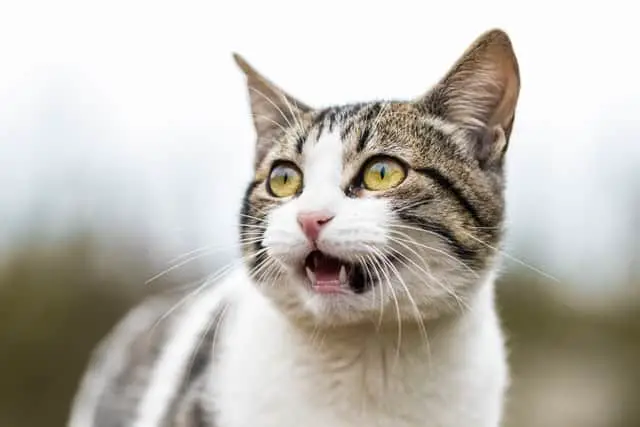Felines chatter their teeth when they see a bird or insect that they cannot catch, but also as bite training they need to hunt

Why do cats chatter their teeth when they have a bird, mouse or insect in front of them that they cannot catch? Scientists answer this mystery in the following article. They do it out of frustration, when their potential prey is out of their reach; but also as training to improve the precise deadly hunting bite that it would need to strike a prey in the wild . Yet another feline mystery ? Cats not only chatter but adapt this sound of their teeth depending on the prey in front of them, something that denotes not only their great physical agility, but also their surprising mental capacity.
Cats chatter their teeth when they see potential prey
Cats chatter their teeth when they are faced with a bird, mouse or insect that they cannot catch. Who shares life with a feline, the following scene will be familiar. The cat is sitting in front of the window watching the approaching birds. Its tail is tossed from side to side. It is at this moment that this sound is heard: a curious dental chattering from the feline. But if you don’t know, here are some great examples of cats versus birds and insects performing this teeth chatter so you know what this article is all about.
But why do cats chatter their teeth and make that peculiar sound? Is the cat talking to themselves frustrated at not catching up with its prey? Does it talk to the bird by imitating its chirping? What is the reason why it chatters its teeth when it has located a possible prey?
Why do cats chatter their teeth when hunting?
Cats chatter their teeth in front of unreachable prey but also as training for a hunting bite
Theories as to why felines chatter their teeth differ. Some experts suggest that this sound may be linked to a certain feeling of frustration: the cat sees its potential prey but cannot hunt it down. Cats that observe unreachable prey, such as birds close by but too tall for their worth, may pull back the sides of their mouth and make an irregular chattering sound with their teeth
This chattering of the teeth is heard when the cat sees a bird on the other side of the window, where the cat cannot get out. Then the animal runs towards the glass, climbs or sits in front of it very concentrated and makes this strange sound. This chattering of teeth can respond well to the frustration of not being able to reach its prey, either because of the excitement caused by having it so close or, surely, to a mixture of both.
Do cats chatter their teeth as hunting training?
Other feline ethologists suggest, on the contrary, that the chattering of teeth would be rather an instinctive behaviour, reflecting the bite on the neck that a cat in the wild would use to hunt. The chattering of the teeth would be, according to these experts, a mere anticipatory reflex movement of the hunt. This would imply that the feline chatters its teeth as a practice of what it will do when it has a prey in its mouth.
When a cat in the wild hunts a bird or rodent, it is very important for them to be able to kill it as soon as possible. Even a small bird could do a lot of damage to the feline, if it is hit in the mouth trying to escape!
The bite of a hunting cat therefore requires experience and precision. Chattering is an innate movement: the feline practices with it the highly specialized deadly bite it needs to give, and does so as if the unfortunate bird were already in its mouth .
Scientific studies in detail have been able to verify that cats in nature make a particular jaw movement during the bite in order to kill their prey as soon as possible. This jaw movement is important, as a bird’s beak or a rodent’s bite in the mouth could do the cat a lot of damage.
Do cats chatter their teeth in imitation?

Is the chattering of the cat’s teeth a sign of frustration? Is it a hunting practice exercise? Scientists at the Wildlife Conservation Society (WCS) go one step further. They suggest that cats not only chatter their teeth in front of their prey, but are able to adapt this sound to resemble that of their potential prey.
Cats are known for their physical agility, but this ability for vocal manipulation indicates that their psychological ingenuity is also impressive






